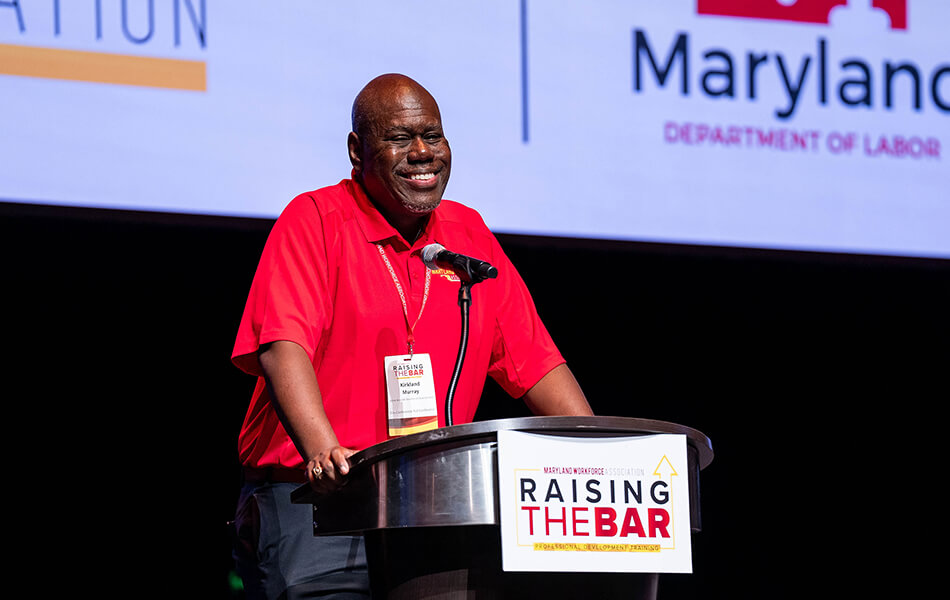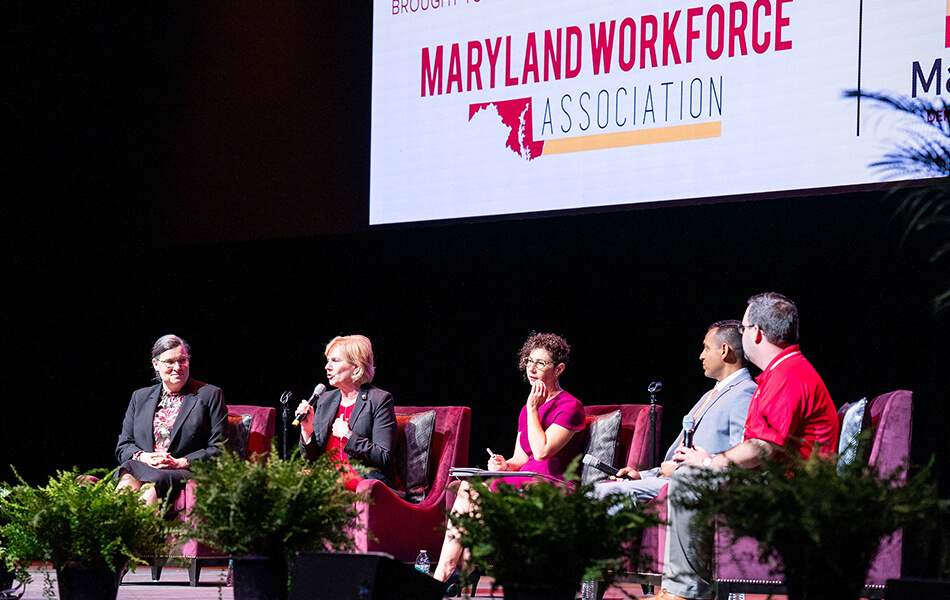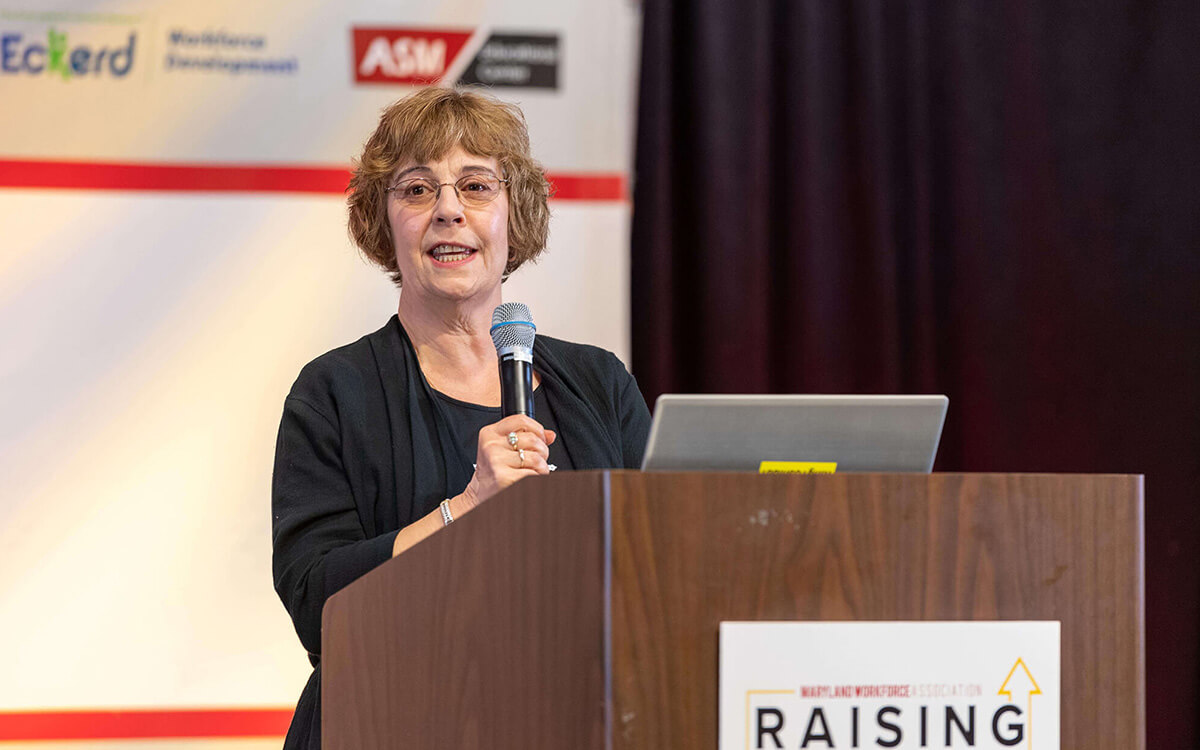Raising the Bar Call for Proposals September 8-10, 2025 Live! Hotel in Hanover, MD
Workshop Solicitation
The Maryland Workforce Association is excited to welcome you back to the Raising the Bar Conference — a signature event that brings together workforce, education, and training professionals from across Maryland and beyond. This is more than a conference — it’s a space for connection, collaboration, and bold conversations that move our workforce system forward.
As the landscape of workforce continues to evolve, we are challenged to be more creative, adaptive, and impactful in how we serve job seekers, youth, and employers. At the same time, the Blueprint for Maryland’s Future calls for deeper alignment between workforce systems, K-12 education, and community colleges to ensure Maryland’s students are fully prepared for college, careers, and lifelong success.
This year’s conference is focused on what it takes to build and sustain a world-class workforce system. Attendees will explore:
~Professional development for front-line workforce, employment, and training professionals.
~Innovative practices and partnerships that are changing the way we work.
~The growing role of apprenticeships and work-based learning models.
~Sector strategies and cross-system collaboration.
~Current and emerging industry trends and the most in-demand jobs across our region.
If you're tackling tough challenges, piloting new ideas, or seeing results from proven strategies — we want to hear from you. Come share what’s working, learn from your peers, and be part of shaping the future of workforce development in Maryland.

Workshop Proposals
Of significant interest are proposals that address innovation, effective delivery of services, and workshops that provide information, tools or ideas that are practical and easily replicated.
The 2025 Raising the Bar Conference will include workshops organized around six tracks and workshops selected will reflect content for beginner, intermediate, and expert level professionals.
We are seeking proposals that offer practical tools, innovative strategies, and forward-thinking ideas aligned with the following key areas of focus:
- Program Support – Focus on the core functions that drive strong workforce program operations and sustainability. Suggested topics include: ~Fiscal management, compliance, and financial strategy
~Human resources practices, including staff recruitment, retention, and organizational culture
~Marketing, branding, and storytelling to highlight program impact
~Advocacy strategies to influence policy and strengthen workforce visibility
~Blending and braiding multiple funding streams to maximize resources - Strategic Partnerships – Showcase how effective collaborations can strengthen workforce systems and expand impact. Suggested topics include:
~Building and sustaining cross-sector partnerships (e.g., education, economic development, human services, industry).
~Aligning partners around shared goals and outcomes.
~Lessons from regional collaboratives and workforce system initiatives.
~Resource alignment, co-investment, and data sharing.
~Engaging non-traditional partners — including philanthropy — to drive innovation and scale. - Business, Industry & Emerging Trends – Explore how workforce systems can stay ahead of evolving employer needs and labor market trends. Suggested topics include:
~Designing and delivering customized training.
~Responding to shifts in the labor market.
~Planning and executing impactful job fairs. ~Creating employer-centered services that build long-term engagement. - Special Populations – Share strategies and practices that support inclusive service delivery for diverse populations. Suggested topics include:
~Approaches for serving long-term unemployed individuals
~Effective engagement of special populations, including:
◦ TCA and SNAP recipients
◦ Opportunity youth
◦ Individuals with disabilities
◦ ALICE (Asset-Limited, Income-Constrained, Employed) populations
◦ Older job seekers - Leadership – Support the growth of current and emerging leaders across all levels of the workforce system. Suggested topics include:
~Succession planning and talent development.
~Staff retention and engagement.
~Building strong and sustainable partnerships.
~Understanding and influencing workforce-related public policy. - Foundations of Workforce – Focus on the building blocks of effective workforce programs and service delivery. Suggested topics include:
~Best practices in work-based learning, internships, and pre-apprenticeship models.
~Adapting service delivery in a post-pandemic environment.
~Strategic K-20 education and workforce alignment initiatives.
We are also accepting proposals for targeted Pre-Conference sessions on Monday, September 8th.
- Career Counseling for Youth – Innovative approaches to preparing youth for future success. Suggested topics include:
~Embedding career counseling into the school day.
~Tools and techniques for career coaches.
~Strategies to help students explore the world of work. - Blueprint Implementation – Support the goals of the Blueprint for Maryland’s Future through early education and system alignment. Suggested topics include:
~The role of high-quality early childhood education in workforce pipeline development.
~Cross-sector collaboration to support long-term career readiness. - High School Level Registered Apprenticeship – Explore how to expand and implement Registered Apprenticeship opportunities for high school students. Suggested topics include:
~Integrating the Registered Apprenticeship model into secondary education.
~The role of pre-apprenticeship in preparing youth for success in Registered Apprenticeship programs.
~Building partnerships between schools, employers, and workforce systems to support youth apprenticeships.
Submission
Workshop audiences will include people interested in learning about innovative methods to serve clients in all aspects of the workforce development system, public policies that support the effective delivery of services, and workshops that provide information, tools or ideas that are practical and easily replicated.


Workshops are 45 minutes of content, with an additional 15 minutes for Q&A; and should encompass best practices, which have demonstrated measures of success. All proposals must be submitted online and must be complete. Required information includes:
1. Workshop Title (10 words or less)
2. Workshop description in 200 words or less
3. Intended Outcomes and Learning Objectives for the Participants
4. Workshop Track/s
5. Presenter contact information and bios, include a one-minute video describing your workshop
6. Explanation of how the program, initiative or strategy was proven to be effective.
Workshop titles may be edited to prepare the conference program. The window for submitting workshop proposals has been extended to 5:00 PM on May 9th.
Content must be informational and educational, not commercial. Presentations that are sales pitches for products or services will be eliminated from consideration.
Review Process
Raising the Bar’s Conference Committee will evaluate proposals based solely on the information submitted. Presenters, titles and content are expected to correspond to the proposal and substitutions of content or presenters require prior approval.
Once a workshop has been accepted, no changes of speakers or workshop content will be allowed without prior approval. Presenters selected will be asked to complete a “Presenter Agreement” form.
Principal presenters will be notified whether their workshops have been accepted by the end of May 19, 2025.
Other Information
Raising the Bar does not subsidize travel, expenses.
- Presenters will receive FREE conference registration the day/s they are selected to present.
- AV equipment will be available, however, presenters should bring their own laptop.
For more information, please contact: MDRTB@MarylandWorkforceAssociation.org and include RTB Call for Proposals in the subject line.
